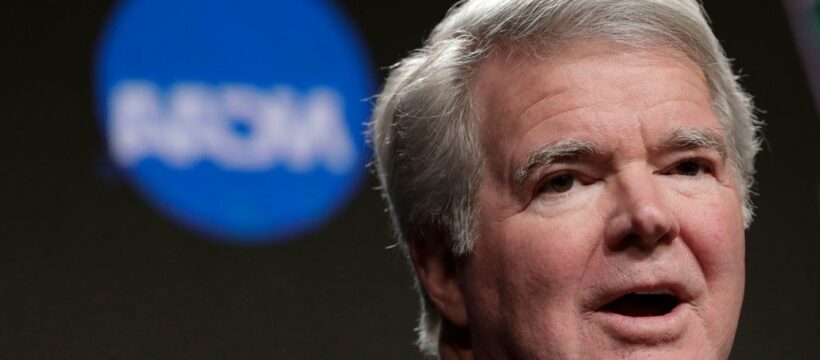- College football reporter.
- Joined ESPN.com in 2008.
- Graduate of Northwestern University.
LAS VEGAS — NCAA president Mark Emmert said trust and collegiality within college athletics is suffering after the recent round of conference realignment and other developments within the industry.
Emmert, speaking Wednesday at the Sports Business Journal Learfield Intercollegiate Athletics Forum, said relations between leagues and individuals are “worse today” than at any time during his 11-year tenure leading the NCAA. He added that it’s a problem for the industry when powerful people are “[criticizing] each other in public and private.”
Big 12 commissioner Bob Bowlsby and others made strong comments earlier this year after Texas and Oklahoma announced they would be joining the SEC.
“When you have these kinds of moves, it disrupts a lot,” Emmert said. “The NCAA and everything in higher education functions through self-regulation. There is no Ministry of Education or Ministry of Sport. The schools regulate each other. Sports is just another example of that. That is utterly dependent upon collegiality, cooperation and trust.
“If you can’t self-regulate an environment on collegiality and trust and good communications, you’ve got a big problem.”
Emmert is hopeful that trust can begin to be repaired, especially with major developments around college sports such as name, image and likeness, and a new forthcoming NCAA constitution. The NCAA’s constitution committee on Monday released another draft of the constitution, which would further embrace NIL and focuses on greater welfare for college athletes.
“Working together on all these issues, including what we’re doing now to reconstitute that, especially the Division I structure, people have to set aside some personal anxieties and frustrations and look at the common interest of the enterprise,” Emmert said. “We’ll get there but it’s going to take it’s going to take time.”
Oklahoma athletic director Joe Castiglione, also speaking at the forum, called Bowlsby “a dear friend” and said he understands why it was so difficult to digest the departures from the Big 12.
“We didn’t have any plan to handle it that way,” Castiglione said. “The timing was not of our choosing. … When the rumors broke, it necessitated a different kind of plan.”
Emmert reiterated his desire for Congress to enact federal NIL legislation while also acknowledging the difficulty of doing so heading into “a very contentious election year.” He said he recently spoke with several U.S. senators who are supportive of federal legislation.
Although no federal policy makes enforcing NIL violations challenging, the NCAA is investigating several agreements and thus far has found that most schools are following guidelines correctly. Emmert didn’t specify how many investigations are taking place or in which states.
“We’ve got to have national clarity on what the rules can be,” Emmert said. We can’t do that without Congress in the current legal environment.”
Emmert also said the NCAA is reviewing recommendations regarding gender equity from the Kaplan, Hecker & Fink law firm, which was commissioned after the men’s and women’s basketball tournaments this spring. While Emmert supports holding future men’s and women’s Final Fours in the same location, NCAA committees ultimately will decide how to proceed. The earliest a joint Final Four site could be named is 2027.
The NCAA is not involved in the College Football Playoff, but Emmert said he advocates expanding the pool of teams and that winning a championship in a power conference “ought to mean something.” The topic of automatic qualification for power conference champions has become a sticking point in expansion discussions, as the initial 12-team model includes spots for the six highest-rated conference champions and six at-large teams.
Mountain West Conference commissioner Craig Thompson, part of the group that proposed the model in June, said he expects a 12-team playoff to be approved, but he isn’t sure when.
Emmert, Thompson and others who spoke Wednesday addressed the recent college football coaching carousel and record-setting contracts for several coaches. Emmert noted that the NCAA and conferences cannot cap coaches’ salaries.
“We’re spending money that we don’t have, and we’re making efforts in areas that we’re going to have to look at differently,” Thompson said.
Source: Read Full Article

